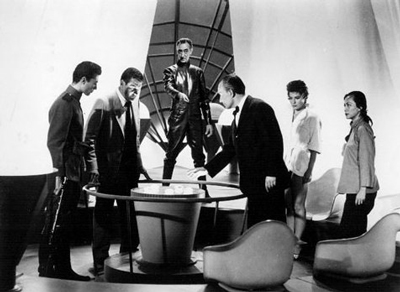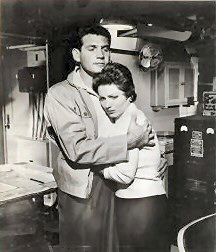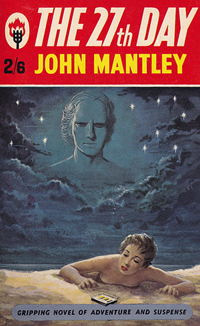
 |
|
|
|
Science fiction fans sought space age thrills in their favorite 50s classics, but on a few occasions they were handed political propaganda. The weird part is that even when the audience thought a movie was pushing one message, it might actually be saying something entirely different. The big case in point is Robert Wise's The Day the Earth Stood Still, still a touchstone movie beloved by no-nuke pacifists. Bringing us a message of peace, handsome Klaatu is shot and harassed by the Big Bad U.S. Army. His farewell is an ultimatum: if we don't abandon warfare we'll be annihilated by a cosmic community fed up with punk planets that don't understand the meaning of civilized behavior. What most viewers don't get is that the 'enlightened' authority out in space is a totalitarian organization that threatens us with destruction if we don't play by their rules. They don't want to help, but to chastize. To these ears that sounds more like colonial repression. The Day the Earth Stood Still has a definite liberal-humanist political agenda, and it still seems fairly courageous in its put-down of military rule and opportunistic informers, like the creep who informs on Klaatu. But other 50s Sci Fi pictures were conceived to express radical opinions. If there's ever a DVD release of the unbelievably propagandistic Red Planet Mars, I'll be rushing to review it. Among the first batch of Sony Screen Classics By Request Burn-on-demand DVD-Rs is the 1957 Sci-Fi thriller The 27th Day, a slightly less outrageous but equally interesting attempt to solve the problems of The Cold War through alien intervention. I'm told that the source book by John Mantley was more allegorical and less specific in its politics, but Mantley himself wrote the script for this economy-grade world-in-peril epic. 
A cultured alien in a black jump suit (excellent character actor Arnold Moss) collects five earthlings for an interplanetary ride in his flying saucer: American reporter Jonathan Clark (Gene Barry), Englishwoman Eve Wingate (Valerie French), German scientist Klaus Bechner (George Voskovec), Soviet soldier Ivan Godofsky (Azemat Janti) and Chinese peasant Su Tan (Marie Tsien). The Alien tells them that his world is dying and that his race wants to relocate to Earth. Morally prohibited from taking life, he nevertheless plans to give the earthlings capsules capable of depopulating the planet, so that we can conveniently eliminate ourselves. In the Cold War climate of hostility, it's assumed that one country would use its capsules before the other could strike, so on and so forth. Returned to Earth, the five possessors of the death capsules proceed in different ways. Soldier Godofsky hides his from his superiors. Su Tan commits suicide, and her capsules self-destruct (the alien said that this would happen to the capsules of any of the five that died for any reason). Eve throws her capsules in to the sea and rushes to America to find Jonathan. The alien has put a deadline of 27 days on the project -- if humanity hasn't been wiped out by that time, the aliens will deem humanity worthy of survival and leave us be, thus assuring their own extinction. Jonathan and Bechner hope to wait out the 27 day period, a tactic that falls apart when the Alien broadcasts the names of the five possessors. Bechner survives an assassination attempt by foreign spies but is hospitalized and unconscious. Jonathan and Eve hide out at a racetrack. A Soviet General (Stefan Schnabel) tortures Ivan to learn the secret of his capsules. Convinced that the Russians will strike first, Jonathan and Bechner show themselves and argue with the U.S. authorities over how to proceed. Bechner wants to decode inscriptions on the capsules in search of a way to alter their function, but the security agents are reluctant to put them in his hands.... only he can open the shell surrounding "his" capsules, but after that anybody can activate them. Each capsule can eradicate all humans from an area with a 3,000 mile diameter. 
On its surface The 27th Day offers a nifty moral dilemma, with the aliens delivering the equivalent of a mythological Pandora's Box -- something too powerful for mortals to handle responsibly. Like a professor presenting a "situational ethics" problem, the Alien spells out the rules of the game for the humans to ponder. We assume that the Alien is telling the truth -- Arnold Moss's performance helps in this respect. Besides, as Jonathan explains, if they just wanted to wipe us out they wouldn't go through all this rigamarole with the capsules. 1 I could go into a more sidebar arguments why the Aliens are hypocrites (kidnap people and then announce your humane intentions?) but we know that they are a plot device to test our species' capacity for ethical integrity. Some of the Earthlings given the capsules react fairly intelligently too, and we identify with the trio left to decide what to do with their six remaining capsules. But The 27th Day gives up its amateur allegory status to come right out with a rather embarrassingly bone-headed anti-Commie statement. The movie's eventual message is not "we must live in peace" but "the only good Red is a dead Red." That's a far cry from The Day the Earth Stood Still's stance, when Klaatu coldly tells an ambassador that he's not interested in our petty international squabbles. The Chinese possessor exits the story through suicide. Her village has been victimized by some kind of military slaughter or another; the movie knows that we'll accept that that's "just what Chinese Commies do." Suicide is normally taboo under the Production Code, but because Su Tan is a presumed non-Christian, the movie can basically say To Hell with Her. It's better to focus on the main Russian enemy, so as not to confuse the mouth-breathers in the audience. The Russians, dazzled by the murderous power of the capsules (which disintegrate people and touch nothing else) go all-out to find a way to knock out all of the United States in one blow. They start by threatening to use their capsules unless we Yanks pull all of our armies back within our continental boundaries. This of course, doesn't make much sense unless you believe the Mutual Assured Destruction theory, that the only thing that kept Moscow from blowing us all to kingdom come was the thought of our retaliating. Mantley's Russkies chortle at their conviction that the foolish American appeasers would never strike first. With the blessing of the Pentagon, Jonathan and Bechner carry out a test in the South Atlantic, just to prove that the capsules do indeed work. Clearing a huge area of the ocean, they activate a capsule while monitoring a single man in a boat. He's another scientist (Frederick Ledebur, "Queequeg" from John Huston's Moby Dick) who has purposely given himself a lethal dose of radiation, to override the Pentagon's moral scruples over sacrificing a volunteer subject. As Ledebur's suicide bid is covered by the Production Code, special censor dispensation must have been granted for martyrs interested in saving the world for "freedom". 2 (movie-spoiling BIG spoilers begin here) 
Let's forget about the many little details, such as why the Russian General lets Ivan stay in the room after he opens the capsule case, enabling anybody to activate the capsules. Professor Bechner decides that, on the basis of a tiny choice of words by the alien, that he might be able to reprogram the rest of the capsules (his and Jonathan's) to perform a different function. Sure enough, he hacks the hieroglyphics on the little silver capsules. When the Russians try to wipe out North America right before the deadline, their plans are foiled by total stupidity. Meanwhile, Bechner tricks his own colleagues, activates his capsules, and without as much as a "hey presto", "alakazam" or 'alley oop!" sends them off on their instantaneous mission of mass extermination. I guess the Russkies were wrong about the West attacking first. The jaw-dropping surprise, delivered over a stock shot of the United Nations, is that Bechner has hacked the capsules to destroy "every enemy of peace and freedom". By which we assume that all the Commies in Russia have been electro-defragmentized, and no Americans have as much as gotten their hair mussed. I don't know about you, but when I first heard this infantile solution to the world's complex problems, I wanted to start breaking furniture. And that was when I was 17 years old, long before I realized that politicians had already rendered the word "freedom" functionally meaningless. I have read plenty of praise from people that extol The 27th Day as thoughtful and inspirational. One sincere posting over on the IMDB says, "I have come to admire its message and its inherent brilliance." All I can say, is that if you feed some people a feel-good story about their own irrational prejudices, and do their thinking for them, they'll crown you king. After that bombshell of idiocy, the U.N. invites the doomed aliens to come down and share the world, a gesture that comes off as an okay touch, despite being presented as just another cheap voiceover. I think I did hear something about giving the visitors places we don't want, the polar regions, etc. That's right generous of us. The final message sent into space could be, "Come on down Ambassador, but remember, NIMBY!" The 27th Day is an inexpensively produced Columbia film, but it's not as embarrassing as some of Sam Katzman's "where's the movie?" excuses for entertainment. The acting is pretty good and the script is mostly free of Z-grade dialogue. Stock shots proliferate, and the couple of shots of flying saucers are Ray Harryhausen's work lifted from Earth vs. the Flying Saucers. They're featured in the posters, which make the movie look like War of the Worlds, "but with a little sex". Valerie French's best known film is Jubal; she bravely tries to inject some romance into the picture. George Voskovek is one of the original 12 Angry Men and German-born Stefan Schnabel played his share of Nazis and Russians. In smaller roles are stalwarts Paul Birch, Grandon Rhodes and Mel Welles; voiceover artist Paul Frees is a radio announcer in a movie that's at least 10% radio announcements and voiceovers. The Sony Screen Classics By Request Burn-on-demand DVD-R of The 27th Day is a clean, sharp, crystal clear transfer indistinguishable from any quality DVD of a B&W feature of this vintage. The dirt on titles and opticals was always there. Columbia includes a suitably hokey trailer that tries for an upscale "important" sales pitch, but hasn't got the footage to back it up -- the trailer has plenty of stock shots as well!
On a scale of Excellent, Good, Fair, and Poor,
The 27th Day rates:
Footnotes:
1. With the survival of their species at stake, the Aliens are awfully fair-minded to give Earth a chance to prove themselves moral creatures. Or maybe not. Giving us super weapons to play with is like throwing hunks of meat at dogs in a pit. Then they can be plausibly sad and surprised: "What, us responsible?" It sounds like passive-aggressive colonialism: exporting arms to less developed countries. 2. Historically speaking, the hypocrisy here is pretty startling. The U.S. Army conducted atrocious Venereal Disease "studies" on involuntary subjects; it also tested nuclear fallout issues using soldiers as guinea pigs. I should think the Joint Chiefs would have Gomer Pyle or Will Stockdale out in that rubber raft before either of them could say, "Golll-eeee!" The idea of the capsules turning out to be benign would really be a joke, sort of an intergalactic 'sting' to justify an invasion: "Well, they would have tried to annihilate each other, right?"
For some reason I'm reminded of the soppy allegorical pacifist song One Tin Soldier, in which a mountain tribe keeps something hidden in their fortress. They let people far and wide believe that it's a fabulous treasure, thus inviting a murderous raid by a covetous neighboring tribe. I have nothing of value in my house, and I'd be crazy to advertise that I kept a fortune in jewels and gold there. Yes, the "treasure" is a symbolic plea for Peace on Earth, but the irony of that song is ridiculously heavy-handed. It needs to end with a lyric saying that the stupid clods asked for everything they got!
3. NIMBY .... Not In My Back Yard. That's archaic Yuppie-speak.
Reviews on the Savant main site have additional credits information and are often updated and annotated with reader input and graphics. Also, don't forget the 2010 Savant Wish List. T'was Ever Thus.
Review Staff | About DVD Talk | Newsletter Subscribe | Join DVD Talk Forum |
| ||||||||||||||||||